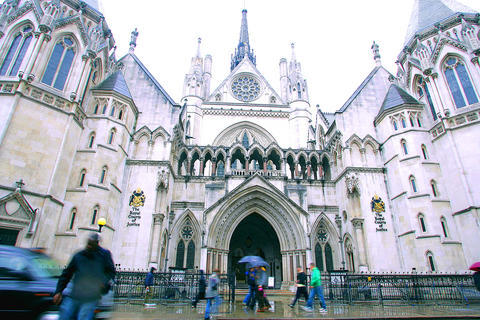After six months of sensational testimony, the inquest into the death of Diana, Princess of Wales, began its final phase on Monday, with the coroner using his summation to dismiss any conspiracy theories involving the royal family or secret service in her death and to rebuke their relentless, deep-pocketed accuser, Mohamed Al Fayed, the owner of Harrods department store.
The coroner, Lord Justice Scott Baker, said there was nothing to support allegations that the Duke of Edinburgh and husband of Queen Elizabeth II, "ordered Diana's execution," nor that Britain's secret intelligence service, MI6, or other government agency played any part in the 1997 car crash that killed her and her lover, Al Fayed's son Dodi Fayed.
"There is no evidence that the Duke of Edinburgh ordered Diana's execution, and there is no evidence that the secret intelligence service or any other government agency organized it," he said.

PHOTO: AP
The five possible verdicts he outlined for the 11-member jury included unlawful killing through "the gross negligence" of the driver, Henri Paul, and "grossly negligent driving" by the paparazzi pursuing the couple.
But, he added: "It is not open to you to find that Diana and Dodi were unlawfully killed in a staged accident."
With British taxpayers' costs for the inquest having passed US$6 million, on top of at least twice that spent on inquiries of the crash by the British and French authorities, the coroner's summing-up appeared to bring the case full circle, back to facts that were known within weeks, or days, of the crash: that Diana and Dodi Fayed died when their Mercedes-Benz, driven at high speed by Paul, who was drunk and trying to outpace the paparazzi, crashed head-on into a concrete pillar in a tunnel under the Pont de l'Alma in Paris in the early hours of Aug. 31, 1997.
Starting last October, more than 10 years after the crash, more than 250 witnesses have marched before the inquest and into the headlines of Britain's newspapers. Testimony examined aspects of Diana's private life and her acrimonious and even fearful relationship with Prince Philip, the father of her ex-husband, Prince Charles.
Rarely have the sensibilities of the British public -- and their prurient interest in the royal family's private life -- been more provoked, or so richly sated by events in court.
In arresting testimony heard in February, Al Fayed called Philip a "Nazi" and a "racist," said his real name "ends with Frankenstein," and demanded that he be sent back to Germany, where the duke has family ties.
He said that Charles had "participated" in the plot so that he could marry Camilla Parker-Bowles, and that the two princes were motivated to save the royal family from having the princess marry a Muslim and bear his child.
The coroner's remarks were a fresh repudiation for Al Fayed, an Egyptian-born immigrant whose bridling resentments as an outsider in the cloistered world of Britain's upper class have made him a thorn in the establishment's side ever since his purchase of Harrods in 1985. His bitterness, based in part on the rejection of his application for British citizenship, formed the crucible for his insistence that Diana and his son were killed on Philip's orders.

IDENTITY: A sex extortion scandal involving Thai monks has deeply shaken public trust in the clergy, with 11 monks implicated in financial misconduct Reverence for the saffron-robed Buddhist monkhood is deeply woven into Thai society, but a sex extortion scandal has besmirched the clergy and left the devout questioning their faith. Thai police this week arrested a woman accused of bedding at least 11 monks in breach of their vows of celibacy, before blackmailing them with thousands of secretly taken photos of their trysts. The monks are said to have paid nearly US$12 million, funneled out of their monasteries, funded by donations from laypeople hoping to increase their merit and prospects for reincarnation. The scandal provoked outrage over hypocrisy in the monkhood, concern that their status

Trinidad and Tobago declared a new state of emergency on Friday after authorities accused a criminal network operating in prisons across the country of plotting to kill key government officials and attack public institutions. It is the second state of emergency to be declared in the twin-island republic in a matter of months. In December last year, authorities took similar action, citing concerns about gang violence. That state of emergency lasted until mid-April. Police said that smuggled cellphones enabled those involved in the plot to exchange encrypted messages. Months of intelligence gathering led investigators to believe the targets included senior police officers,

The United States Federal Communications Commission said on Wednesday it plans to adopt rules to bar companies from connecting undersea submarine communication cables to the US that include Chinese technology or equipment. “We have seen submarine cable infrastructure threatened in recent years by foreign adversaries, like China,” FCC Chair Brendan Carr said in a statement. “We are therefore taking action here to guard our submarine cables against foreign adversary ownership, and access as well as cyber and physical threats.” The United States has for years expressed concerns about China’s role in handling network traffic and the potential for espionage. The U.S. has

A disillusioned Japanese electorate feeling the economic pinch goes to the polls today, as a right-wing party promoting a “Japanese first” agenda gains popularity, with fears over foreigners becoming a major election issue. Birthed on YouTube during the COVID-19 pandemic, spreading conspiracy theories about vaccinations and a cabal of global elites, the Sanseito Party has widened its appeal ahead of today’s upper house vote — railing against immigration and dragging rhetoric that was once confined to Japan’s political fringes into the mainstream. Polls show the party might only secure 10 to 15 of the 125 seats up for grabs, but it is